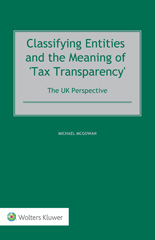2023 - Wolters Kluwer
E-book
Digital Version
Lectura en streaming | NO Descarga | NO Copiar/pegar | NO Impresión
Classifying Entities and the Meaning of 'Tax Transparency' : The UK Perspective
344 p.
- Imposing UK tax on an entity or those linked to it involves understanding what kind of entity is being dealt with, especially when it is formed outside the UK. Is it a company, a partnership, a trust or something else? This often involves considering whether the entity is 'tax transparent' and if so, what that means. While of great importance, the UK tax rules for classifying entities are notoriously vague, as is the UK meaning of 'tax transparency'. This book breaks new ground by exploring these topics comprehensively, in a world which is well aware of the problems created by entity classification mismatches.In so doing, it addresses, with emphasis on UK tax law, issues such as:the meaning of a 'partnership' and a 'trust';what is meant and is not meant by 'tax transparency', across a range of taxes and situations;how tax treaties have dealt with entity classification questions and related 'transparency' issues;how entity classification questions are impacted by EU law; andhow the UK approach could be improve
- d, policy-wise and practically, without facilitating tax avoidance.The book compares in detail the UK entity classification approach with that of the US, the Netherlands and France. Appendices consider the unusual UK capital gains tax treatment of partnerships, as well as the special transparency rules which can apply where a partnership is party to loans or derivative contracts, or owns intangible assets.Questions of entity classification and tax transparency are of fundamental importance in any mature tax system and especially in a globalised economy. This book unlocks those questions for both academics and practitioners. [Publisher's text].
- Special access authorizations may apply; please contact us for further information.
-
Información
ISBN: 9789403537658


